Recently, UK defence expenditure as a percent of GDP remained at 2.1% in 2017, the Ministry of Defence’s international defence expenditure report claimed.
Total NATO expenditure was set at $959bn, an increase of $30bn since 2016. This increase primarily came from a rise in defence spending in the USA and Canada.
Compared to 5 members in 2016, only 4 members met their 2% of GDP defence spending target in 2017: the US, Greece, the UK, and Estonia. Poland slipped the threshold below to 1.98%.
Interestingly, the country with the smallest spend on defence as a percentage of GDP, Luxembourg at 0.55%, also had the largest proportion of their defence expenditure spent on equipment, at 42%.
Globally, the top four defence spenders have been the same countries since 2014 (USA, China, Saudi Arabia, Russia), although Russia has fallen from 3rd to 4th place this year.
One challenge we face is from a more assertive Russia. What we’ve witnessed in recent years is an increasingly dangerous and unacceptable pattern of behaviour: Russia’s aggressive actions in Ukraine; its military build up from the north of Europe to the Middle East; its use of hybrid tactics, cyberattacks, disinformation, interference in democratic elections; its efforts to undermine the international rules-based order; as well as the offensive use of a nerve agent in the UK, the first time on NATO soil. Unfortunately, there is no indication on Russia’s part of any willingness to change, so NATO will maintain its dual track approach to Russia: strong deterrence and defence, combined with the continuing search for meaningful dialogue.
But this is not the only challenge we face. Since the 9/11 attacks on the United States, NATO has been at the forefront as well in the fight against terrorism. Hundreds of thousands of our armed forces have fought side by side in Afghanistan. Many have made the ultimate sacrifice, including more than 80 French soldiers. We honour them.
We also see instability and turmoil in North Africa and the Middle East, leading some to commit extreme acts of violence and many others to flee for their lives, leading to the largest refugee and migrant crisis in decades. Again, NATO is making efforts to project stability in those countries, because if our neighbours are more stable then we all are more secure.
At our Brussels Summit in July, leaders took the decisions needed to bolster our security, including in the fight against terrorism. To help prevent ISIS, or Daesh, from returning, we have launched a new training mission in Iraq to establish professional military schools for the Iraqi forces. We also agreed to increase our support for Jordan and Tunisia, to strengthen their ability to combat terrorism. At the July Summit, leaders agreed also to bolster our deterrence and defence with a new readiness initiative, the Four Thirties: 30 mechanised battalions, 30 air squadrons, and 30 combat vessels, ready to use within 30 days or less. In response to increasingly sophisticated cyberattacks, we are ensuring that we are as capable in cyberspace as we are in the other three domains of operation: air, sea and land. Several Allies have now offered up their cyber capabilities to NATO, and Allies work closely to thwart such cyber attacks.
We are updating our command structure, with a new command for the Atlantic, based in Norfolk, along with ACT in the United States, and a new command in Ulm, Germany, for support and logistics. Both of these will help our forces become more mobile, enabling rapid reinforcement across the Alliance and across Europe, and ensuring we have the right forces in the right places at the right time. Also, we must ensure that they are at a higher state of readiness.Â
In recent years, NATO and the European Union have achieved an unprecedented level of cooperation, working together on issues as diverse as maritime security, countering hybrid warfare and fighting terrorism. We exchange real time warnings on cyberattacks, increasingly participate in each other’s exercises, including this very month the so-called PACE exercise that the European Union is running. We also work closely on strategic communications and countering propaganda, among other things. These are areas that are so critical to addressing the disinformation that is constantly flowing now in this, as I say, hybrid warfare environment.
These are the steps we are taking to ensure, at a time of increased instability, that our people are safe. But this does not come for free. That is why, in 2014, every Ally agreed to stop cutting defence spending and to gradually move toward spending 2% of gross domestic product on defence. We affirmed this defence investment pledge at the Warsaw Summit, and reaffirmed it strongly at our July Summit this year in Brussels, with a renewed sense of urgency and a renewed sense of purpose. We have made significant progress; 2018 will be the fourth consecutive year of rising defence spending. This year, European Allies and Canada have boosted their combined defence budgets by over 5%, to 5.2%, the biggest increase in real terms in a quarter of a century. Over the past two years, those same countries have spent a cumulative US$41billion more on defence, and this is significant. There is still a long way to go however. We are heading in the right direction, but we have much more work to do.
Every nation is now committing to develop credible national plans on how they will get to 2%. Allies will deliver those plans by the end of this year and, when the Defence Ministers meet next February, they will be reporting on progress made. I very much welcome the fact that on the eve of La Fête Nationale, President Macron and the French parliament signed into law France’s commitment to reach 2% within the next military programme period. France is once again leading by example.
But this is not just about money, by any means. It is also about how we spend that money, the capabilities we obtain with it, and our commitment to then use those capabilities to protect our nations and our citizens. Again, I very much welcome these same messages being hit so hard by Minister Parly and her remarks just a few moments ago.
In addition to national efforts, common funding continues to be a vital expression of Alliance solidarity and cohesion. It may be relatively small compared to overall spending, but common funding has an important multiplier effect, enabling us to sustain our command structure, our common platforms, such as AWACS and the new Alliance ground surveillance system (AGS) and to enhance our interoperability through investments in command, control and communication.
The new governance model for the delivery of commonly funded capabilities, endorsed by leaders at the Brussels Summit in July, is a key step forward. I know it has taken time to come to consensus on this, and there is still more work to be done, but it is a good example of what having an honest assessment and daring to think in new ways can accomplish.
Ladies and Gentlemen, as our security environment becomes ever more complex and less predictable, we need to increase the resources we commit to our defence, and we need to do more with those resources, for our defence to remain coherent and credible. You, our resource community, have a central role to play in support of the adaptation of our Alliance, to meet the challenges that we face. I call on you all to use your deep knowledge, your excellent experience, your imagination,s indeed, to help that ongoing process of adaptation in the years and decades to come. Too often, people think of resources in terms of constraints only, but resources are also a wellspring of opportunity, including in this Alliance. So, as you meet today and tomorrow here in Paris, and as you continue your work in capitals or in the field, or wherever you currently call home, I urge you to embrace the opportunity to help us safeguard the freedom and security of the nearly one billion citizens that make up the NATO Alliance.
So, thank you very much for the opportunity to speak to you this morning. I wish you all the best for a successful conference and I look forward to hearing the results of your discussions. Thank you very much.”


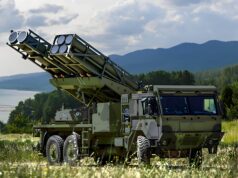

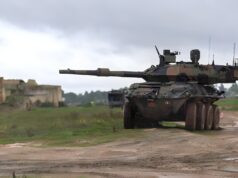
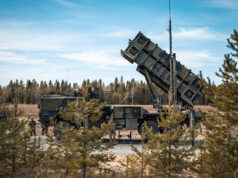
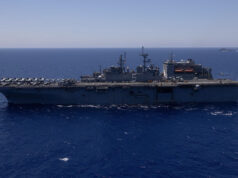
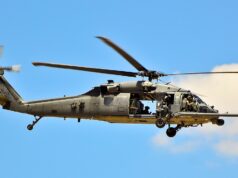
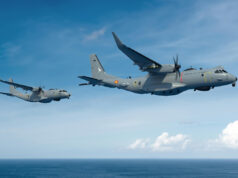
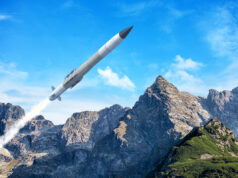

Been over this so many times.
UK fiddles the figures.
Germany free rides.
2 % seen as the target. It should be the minimum.
HMG favour Industry over military.
Results in likes of Wildcat for Army.
Military gets smaller.
Military Industrial Conplex gets richer.
Defence needs more money.
Current HMG probably not listening.
Opposition certainly not interested. ( Ideology )
Industry over the Military. How do you come to that conclusion?
Bloke On The Range has just published a wonderful video on the YouTube on the L85A1.
Watch it and it will all become clear as it is the best example of industry before military.
I can’t watch it again as it is giving me too many flashbacks to the early 90s! 🙂
Glad to see we are staying current. You could have commented in Nimrod as that was at least under development this century. L85A1 went out of production over 20 years ago.
I would say Boxer or Ajax or even Tide Class Tankers show that our politicians currently favour top line price over value for money.
The point was industry before military and it is as good an example as any if not the best.
When a wise man points at the moon and all that…….
Succinct and correct!
Time to get tough? Set a deadline of 5 years, if expenditure is not genuine and at 2% your out. No pensions, no legal costs, just expenditure on the actual active military of each country.
Would we see a quick and positive reaction or would it be the end of the alliance?
NATO should provide a framework in a revised membership treaty along the lines of 2+% actual military expenditure. Agree minus pensions, recruitment, strategic nuclear deterrent (in UK case) litigation, cyber and intelligence services. Otherwise you are out. Agree
Once you take out those items from UK defence budget I worked out UK actually spends about 1.67% on defence. A great deal of the problems come from Osbourne and his creative accountancy and smoke and mirrors processes. This left our armed forces hollowed out and empty of actual capability. Like weaponry on ships or numbers of fast jet squadrons.
Okay say your the PM of a western european country. You spend only a fraction of the 2% NATO urges you to. You have an opposition party that either criticises you for not not spending enough on Health, education law and order etc or that you are taxing people and business to such an extent as to seriously harm the economy. Your told that Russia is getting stronger and stronger and more and more reckless. But between you and them are over half a dozen other countries who would be in the firing line long before yours. Additionally you know that the US and UK consider it a vital national security necessity to stop Russia from taking over your country and would fight to prevent it. What would you do ?
I think really France, Germany, and Benux countries need to go their own way, perhaps lump Spain in there too.
Do some members see the Russian threat as subjective, and in part vacuous? No matter how much the voices of doom within the organization warn of impending conflict, many may simply pay lip service and carry on. The ‘Wolf’ factor does play a significant part in current NATO behaviour, and only strengthens the doubter’s arguments? When it’s declared Russian military spending has in fact reduced according to the findings above, this can only add fuel to the fire of skeptics.
Germany knows Russia does not pose a threat to them directly. I am not sure how much of a threat Russia pose to the Baltic states either. They are not as strategically important as Ukraine and their Russian populations are also smaller, so while Russia would like to have a degree of influence, I do not see tanks crossing their border unless there has been a serious misunderstanding before hand.
They should still pose at least some sort of deterrent threat though, today France, UK, Germany and the Netherlands could not field 600 MBT’s at short notice, I think Russia has around 2,000 in active service which is quite damning really.
Do they have the logistics chain and communications to support and co-ordinate a 2000 tank armoured thrust into the belly of Europe?
No, the threat is certainly not vacuous, although any threat can be seen as subjective.
I believe the threat to be very real; a threat that will only get worse. We are pretty much back on Cold War terms, yet we don’t seem to accept the fact.
Little Vlad would like nothing more than to take Kiev and if the chance arises Belarus (If Lukashenko were to die tomorrow, Russia wuld move straight in). Then you would have a much bigger border with NATO.
In regard to the Baltic States, in Estonia at least 25% of the population is of Russian ethnicity.That’s more than the 17% or so in Ukraine, although it still only amounts to around 300,000 peope in Estonia.
I agree Belarus will have an awkward transition when Alexander Lukashenko leaves the stage. He has been happy being propped up by Russia in exchange for Russian money, but has apparently tried to distance himself from Russian influence since Crimea was annexed.
It would be interesting to see if Belarus would try to elect a pro EU leader or if the Ukraine experience will put them off. They would certainly run out of money and heating very quickly if they did and the EU would very little to back them up beyond rhetoric.
They are in a rock and a hard place: regardless of whether they try to elect a pro EU leader or not, Russia will take the country over.
We need to stop appeasing countries like Russia in the hope they will gradually see sense (as we see it). They won’t. Our response has to be way tougher.
I think Europe is staring at its own backside while threats continue to rise; a bit like a lobster slowly boiling to death; UK included. Asia is in an arms race which leaves a lot of Europe as also-runs in comparison. Only a major threat or incident is likely to wake us up. It may be too late by then. Modern technology over all media would enable authoritarian take over very quickly, seeing how Russia & China are so expert at it & politics in the West has become so polarised & toxic. Are we seeing the death of free speech as the list of no-go areas rises even in so-called liberal democracies?
The UK would do well to not just raise spending on the military(easily done by creative accounting, as we’ve seen), but have a genuine strategy to increase quality & numbers/depth so we can pull our own weight in being far better able to protect ourselves & strategically vital areas & help our allies. An alliance of weak, complacent members is a liability, an invitation to be taken over by anyone strong & ruthless enough. Western democracy is under threat from it’s own immorality, intolerance of opposing views, governments that are mainly concerned with the ultra-rich at the expense of its people-draining their economies of wealth to sit off shore whilst society falls apart, as well as Islamic extremism & authoritarianism(e.g. Russia & China, Saudis, Turkey, Egypt, Syria.)
Now is not the time to permit any more defence cuts. I loathe Trump, but if he makes the European NATO members wake up to their reckless weakness militarily(including us), then that can only be a good thing. The public should be better informed, but they’ve has such a damaging, traumatic & painful ride through austerity, it’s no wonder other concerns have occupied them while HMG trot out the2%, ever investing mantra to smokescreen the reality of decline.
“Walk softly but carry a big stick”, the saying goes. But if you walk any way you like while carrying a twig, you’ll be pushed around & laughed off the world stage & many of your people will die unnecessarily on the battlefield. If the only stick of note you have is a nuclear deterrent, then that will become the only option far sooner than it ever needed to be.
The weaker free Europe gets, the less weight its voice caries on the world stage.